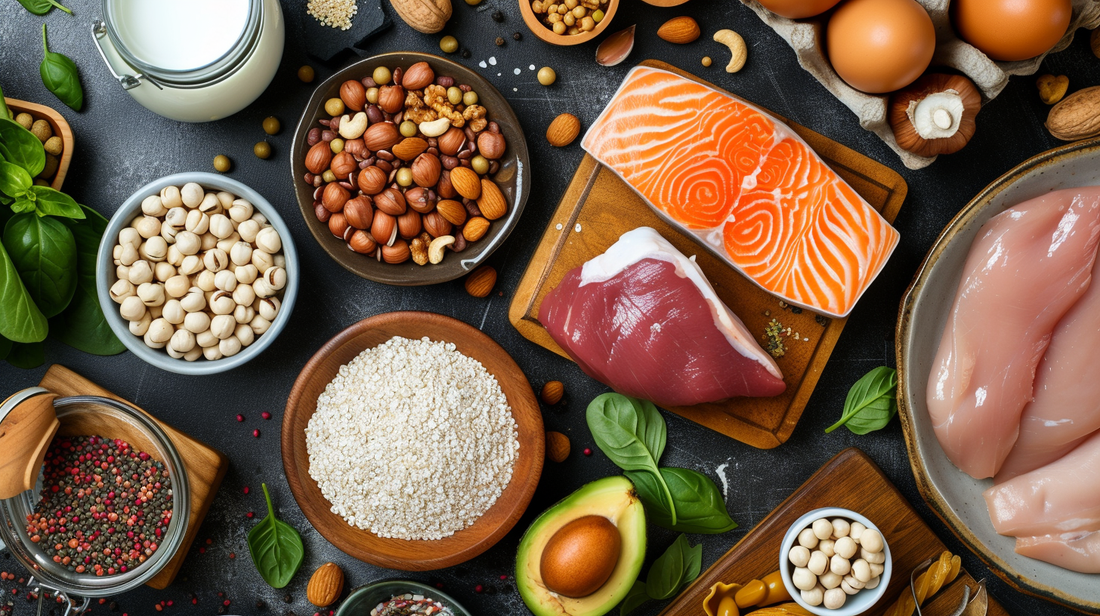
Protein-rich diet: The key to successful muscle building
Share
4-6 min reading time
Introduction
Imagine you are standing in front of a building – your body. Every stone, every detail, is the result of dedicated work and the right raw materials. One of these indispensable building materials? Protein. In the world of muscle building and general health, a high-protein diet plays a key role, similar to a skilled builder who knows precisely how and where to place each stone.
Protein is more than just a building block for muscles. It is a multifunctional tool that supports the body in many ways: it promotes strength, helps maintain muscle mass and improves body composition. But it's not just about muscles. A diet high in protein also plays a central role in metabolism, supports balance, increases agility and can even help control appetite.
In this article, we delve into the world of proteins, explore their diverse roles and show how a high-protein diet can enrich your life - whether it's building muscle, general health or achieving your fitness goals. Let's take a closer look at this essential building block together and discover how it can improve our lives.
Importance of protein for building muscle
Protein is the foundation on which muscle building and physical strength rest. It plays a crucial role in the process of protein synthesis, the heart of muscle building. Without adequate protein supply, it is difficult for the body to create new muscle fibers and repair existing ones, especially after strenuous workouts. Proteins are not just building blocks for muscle tissue; they are also essential for maintaining muscle mass, which is particularly important for promoting a healthy metabolism and effective fat burning. So a strong, muscular body is not only a sign of strength, but also a key to maintaining a healthy, active metabolism.
Health benefits of a high protein diet
A high-protein diet does much more than just build muscle. One of the key elements is improving body composition. Increased protein consumption allows the body to break down fat more efficiently while maintaining or gaining muscle mass, resulting in a slimmer, toned appearance. Additionally, research shows that increasing protein intake may reduce the risk of type 2 diabetes. This is because protein can stabilize blood sugar levels and improve insulin responses. Another significant benefit is appetite control. Protein keeps you fuller for longer and prevents excessive snacking or overeating during main meals, contributing to a more balanced and healthy diet overall.
Myths and misconceptions
To clear up myths and misconceptions about high-protein diets, particularly as they relate to kidney and heart health, we need to challenge some common assumptions. A common myth is that high protein intake is bad for the kidneys. While it is true that people with existing kidney disease should monitor their protein consumption, there is no solid evidence to suggest that high-protein diets cause kidney damage in healthy individuals.
Another myth concerns the risk of cardiovascular disease. Some believe that consuming a lot of protein, especially from animal sources, may increase the risk of heart disease. In reality, the risk is more related to the type of protein sources. For example, high-fat red meat can increase the risk, while lean meat, fish and plant-based protein sources such as legumes and nuts can have beneficial effects.
It's important to focus on a balanced diet that includes high-quality sources of protein while being rich in fruits, vegetables, and healthy fats. Such a diet can promote overall health and reduce the risk of chronic diseases.
The top protein sources
When choosing the best protein sources, there are a variety of options, from both animal and plant sources. Each of these sources brings its own benefits and can be part of a balanced, protein-rich diet.
Animal protein sources:
Chicken Breast : A classic favorite among athletes, high in protein and low in fat.
Eggs : An excellent source of complete proteins containing all essential amino acids.
Fish : Particularly fatty fish like salmon are rich not only in protein, but also in omega-3 fatty acids, which offer numerous health benefits.
Lean Beef : An excellent source of protein that also provides important nutrients like iron and zinc.
Dairy : Milk, yogurt, and cheese are not only rich in protein, but also provide calcium and other important nutrients.
Plant protein sources:
Lentils and legumes : A great source of protein for vegetarians and vegans, also rich in fiber and micronutrients.
Tofu and Tempeh : Made from soy, these foods are versatile and a good source of protein for vegan diets.
Nuts and seeds : Like almonds, chia seeds, and flaxseeds provide not only protein, but also healthy fats and fiber.
Whole grains : Certain grains like quinoa and buckwheat are not only good sources of protein, but also provide complex carbohydrates and fiber.
Plant-based protein powders : Pea protein, hemp protein, and rice protein are popular alternatives to animal protein powders and can be used in shakes or when cooking.
A balanced diet that utilizes a variety of these protein sources can help meet daily protein needs while providing a variety of other important nutrients.
Practical tips for integrating it into everyday life
Incorporating a protein-rich diet into your daily routine is easier than you might think. Here are some practical tips on how to achieve this:
Plan meals : Start by planning your meals in advance. Include protein-rich foods at every meal.
Breakfast : Start your day with a protein-rich breakfast. Consider options like eggs, Greek yogurt, or protein shakes to start your day with energy.
Snacks : Keep healthy, protein-rich snacks on hand. Nuts, seeds, cottage cheese or a piece of hard cheese are great options.
Lunch and Dinner : Include a good source of protein in each main meal. Chicken breast, fish, tofu, lentils or beans can make a meal both enriching and filling.
Variety is important : Change your protein sources regularly to get a wide range of nutrients. Combine animal and plant proteins.
Post-workout : After a workout, a protein-rich snack is ideal to support muscle recovery. A protein shake or yogurt with fruit can be quick and effective.
Pay attention to portion sizes : Pay attention to portion sizes to ensure a balanced intake of macronutrients.
Preparation is key : Make meals ahead or have ingredients on hand to quickly whip up healthy, protein-packed meals.
Incorporate protein into salads and soups : Add chicken strips, tuna or chickpeas to salads to increase their protein content.
Healthy Cooking : Experiment with healthy cooking methods such as grilling, steaming or baking to preserve the natural flavor and nutritional value of protein-rich foods.
By using these tips, you will find it easier to incorporate a high-protein diet into your daily routine and enjoy the health and muscle building benefits.
Conclusion
In summary, a high-protein diet is a cornerstone for muscle building, improved body composition and overall health. In addition to being crucial for building and repairing muscle tissue, proteins help stabilize blood sugar levels, reduce the risk of type 2 diabetes, and help control appetite. The myths that high-protein diets are harmful to the kidneys and heart have been debunked as long as one focuses on a balanced selection of protein sources.
Animal and plant protein sources each offer unique benefits and should be part of a balanced diet. Incorporating a high-protein diet into your daily routine is easy to implement through simple steps like meal planning, including protein in every meal, and keeping snacks healthy.
I encourage you to rethink your eating habits and explore the multiple benefits of a high-protein diet. It's not just about building muscle or staying fit; it's about comprehensively improving your health and quality of life. With the right information and conscious choices, you can harness the power of protein and take a positive step toward a healthier, more active lifestyle.
FAQ: Frequently asked questions
Is too much protein harmful?
Too much of anything can be problematic, but a high-protein diet is usually safe for healthy people. It is important to follow a balanced diet and pay attention to signals from your own body.
How much protein do I need daily?
Daily protein needs vary depending on body weight, activity level and health goals. A general rule of thumb is that 1.2 to 2.0 grams of protein per pound of body weight is recommended, especially if you're actively trying to build muscle.
Can I get enough protein as a vegetarian/vegan?
Absolutely! There are many plant-based protein sources such as lentils, beans, tofu, tempeh, nuts and seeds that are excellent sources of protein.
Does protein help you lose weight?
Yes, protein can help you lose weight. It is filling and can help reduce overall calorie consumption while helping the body maintain muscle mass.
Should I use protein shakes or supplements?
Protein shakes and supplements can be handy for meeting daily protein needs, especially if you're short on time or need extra help building muscle. However, they should not be used as a substitute for a balanced, whole-food diet.
Do you have questions about high-protein diets or your own experiences that you would like to share? Or are you curious about how you can optimize your diet for better muscle building? Let us know in the comments or subscribe to our newsletter for more helpful tips and current information about health and fitness! Your journey to a stronger, healthier you starts today – we are here to support you!
